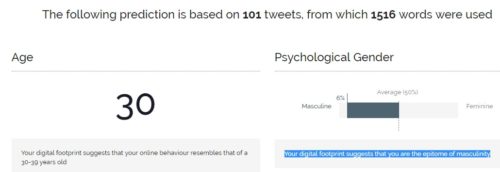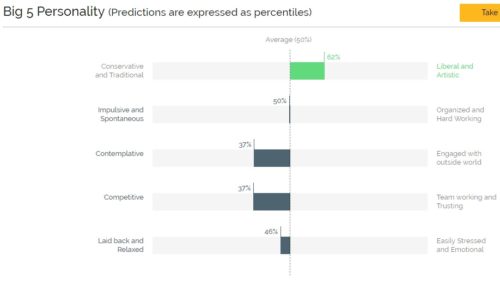Report from Scientific American.
From ApplyMagicSource.com after I gave it access to my Twitter account:
Openness to experience describes a dimension of personality that distinguishes imaginative, creative people from down-to-earth, conventional people.
Your digital footprint suggests that you are intellectually curious and appreciative of what you consider beautiful, no matter what others think. You might say that your imagination is vivid and makes you more creative than many others.
Conscientiousness concerns the way in which we control, regulate, and direct our impulses.
Your digital footprint suggests that you are random and fun to be around but can also plan and persist when life requires it. It appears that depending on the situation, you can make quick decisions or deliberate for longer if necessary.
Extraversion is marked by pronounced engagement with the external world, versus being comfortable with your own company.
Your digital footprint suggests that you are similar to people who prefer low-key social occasions, with a few close friends. You might say that it’s not that you are afraid of large parties; they’re just not that fun for you.
Agreeableness reflects individual differences in concern with cooperation and social harmony.
Your digital footprint suggests that you can find it difficult to get along with others when you first meet them. You might be suspicious of others’ motives in this situation. It also looks like people warm to you over time, and you to them, although that doesn’t stop you telling them “how it is”.
Neuroticism refers to the tendency to experience negative emotions.
Your digital footprint suggests that you are generally calm. You come across as someone who can feel emotional or stressed out by some experiences, but your feelings tend to be warranted by the situation.Introverted iNtuitive Thinking Perceiving
INTPs are quiet, thoughtful, analytical individuals who don’t mind spending long periods of time on their own, working through problems and forming solutions. INTPs tend to be less at ease in social situations and the “caring professions” although they enjoy the company of those who share their interests. They also tend to be impatient with the bureaucracy, rigid hierarchies, and politics prevalent in many professions, preferring to work informally with others as equals.INTPs’ extraverted intuition often gives them a quick wit, especially with language, and they can defuse the tension in gatherings by comical observations and references. They can be charming, even in their quiet reserve, and are sometimes surprised by the high esteem in which their friends and colleagues hold them.


